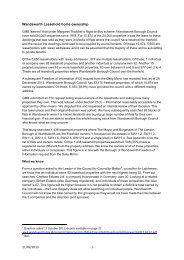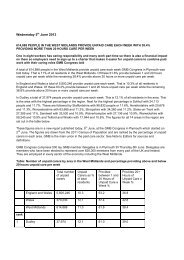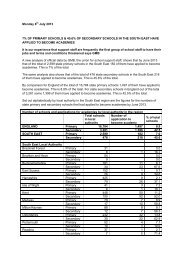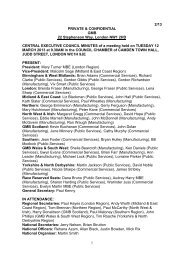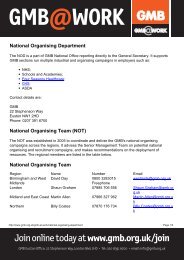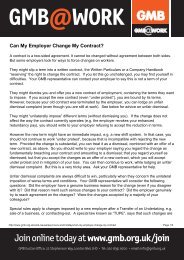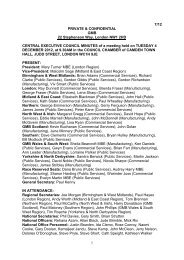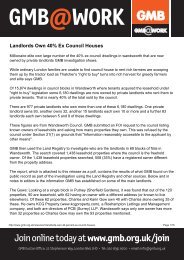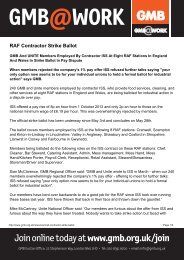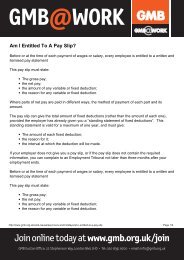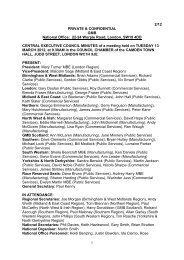WO toolkit 2012 complete.pdf - GMB
WO toolkit 2012 complete.pdf - GMB
WO toolkit 2012 complete.pdf - GMB
Create successful ePaper yourself
Turn your PDF publications into a flip-book with our unique Google optimized e-Paper software.
SECTION 4.3<br />
DEALING WITH MEMBER’S DISCIPLINARY HEARINGS<br />
Members will approach you and tell you that they have been called to a Disciplinary or Investigation<br />
Meeting.<br />
You will first need to get a copy of the disciplinary procedure where you work.If there is no procedure<br />
advise your employer that the ACAS minimum applies,(see section 4.2).However the standard practice<br />
is as follows:<br />
1. Investigation stage: This will probably include interviews with your member and is designed to find<br />
out if any disciplinary action is required.You are entitled to represent your member at these<br />
meetings.<br />
2. Exchange of evidence,witness statements and other documents between yourself and<br />
management prior to the hearing.<br />
3. Disciplinary Hearing.<br />
4. Appeal Hearing.<br />
BEFORE THE HEARING<br />
• Make sure of the facts and get the full story from the member.You will be in a difficult situation if<br />
any evidence or facts are presented by management at the hearing that your member had not<br />
informed you of.<br />
• Make sure that you understand the procedure.<br />
• Make sure that management are following their own procedure.<br />
• Advise the member of the possible consequences if the hearing goes against them which,<br />
depending on the gravity of the alleged offence,may include dismissal.<br />
• Talk to independent witnesses if you can,management certainly will.<br />
• Ask to see copies of witness statements taken by management and exchange all such documents.<br />
Do not be rushed into a disciplinary hearing. Insist on time to prepare your case.<br />
Remember that the burden of proof lies with management.<br />
ASK YOURSELF THE FOLLOWING QUESTIONS:<br />
• Have adequate and clear instructions been given by management?<br />
• Has appropriate training been given?<br />
• Has a similar‘offence’been committed before(not necessarily by the individual(s)concerned this<br />
time)?<br />
• Were any warnings given at that time?<br />
• What was the punishment?<br />
In consultation with the member,decide whether it is better to argue mitigating circumstances rather<br />
than deny any wrong doing.Arguments in mitigation might include:<br />
• Behaviour previously tolerated.<br />
• Previous good record.<br />
• Lack of information or training.<br />
• Domestic pressures.<br />
• Medical reasons.<br />
• Unclear or unwritten rules.<br />
Make sure you have a full written report of the matters to be discussed following the investigation<br />
hearings.



